Asilomar 2016 30th Annual Asilomar Conference
Presidents’ Day Weekend, February 12-15, 2016
Sign Up For The Upcoming Asilomar
“A faithful study of liberal arts humanizes character, and allows it not to be cruel.” -- Ovid
For the 30th year, Asilomar welcomed us to a weekend of renewal, learning, and friendship. This year’s conference reminded us of the pleasures of a dialogue in the liberal arts – a conversation that flows from history to literature, from biology to design, from neuroscience to music to foreign affairs. Once again we had a slate of extraordinary speakers representing a broad range of disciplines and pursuits. As always, we looked forward to sharing a mental workout but also to the privilege of renewing old friendships and beginning new ones – all in a location of exceptional peace and beauty. Thank you for joining us in what was a lively and exhilarating exchange.
Deirdre Frontczak, Asilomar Chair
Program
Friday, 7:30 p.m. Welcome and Introductions.
Dr. Deirdre Frontczak, PBKNCA
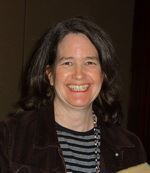 Friday night, 7:45 p.m. Dr. Mary Albert, Filmmaker
Friday night, 7:45 p.m. Dr. Mary Albert, Filmmaker
The Great Tidepool: The Story of Ed Ricketts’ Scientific System
The documentary film The Great Tidepool uncovers the pioneering scientific system of Edward Flanders Ricketts, the renowned Californian marine biologist who in the 1930s wrote the world’s most famous and influential seashore guidebook – Between Pacific Tides. Based on their research centered on the Ricketts’ collection at Stanford University Library, Steven and Mary Albert piece together Ricketts’ own explanation of his groundbreaking ecological scientific system.
Drs. Steven and Mary Albert live and work in Pacific Grove. Their films on subjects including hermit crabs, sanderlings, the geology of the shoreline, and Ed Ricketts, have won awards at international festivals and are shown at natural history museums and scientific institutions, including the Smithsonian’s National Museum of Natural History.
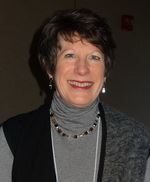 Saturday morning, 9:30 a.m.: Christine Schulz, J.D.
Saturday morning, 9:30 a.m.: Christine Schulz, J.D.
World Fluency: A Critical Skill for the 21st Century
The integration of capital, technology and information across national boundaries has forced globalization and impacted every career path in today’s world. A globally focused curriculum, including languages, is not a luxury but a necessity our nation’s schools. Four key points support a comprehensive educational framework with world fluency at the core: international business; national security; better scores, better students; and responsible, global citizenship. In a “world café” format, participants will explore some of the opportunities and obstacles for ensuring that our nation’s youth have the requisite skills for success in the 21st century.
Christine Schulze is vice president for Concordia Language Villages of Concordia College. She has been a keynote speaker on global citizenship, language and cultural immersion techniques and creative management techniques in a not-for-profit environment. Currently, she serves as chair emeritus of the board for the Alliance for International Educational and Cultural Exchange in Washington, D.C. See her recent blog at WorldView: A Language Blog
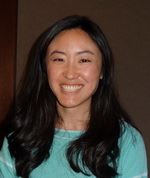 Saturday afternoon, 1:30 p.m.: Cheri Mah, M.S., biology and cognition
Saturday afternoon, 1:30 p.m.: Cheri Mah, M.S., biology and cognition
Sleep! Who Needs It?
Cheri Mah, 2015 PBKNCA Scholarship Awardee, developed a fascination with sleep in athletes in 2002 during her first year at Stanford (BAS, MS; PBK) A double major in psychology and biology, she noticed several collegiate swimmers who walked into the lab grinning, having set multiple personal records while on a schedule to eliminate accumulated sleep debt. This particular study was designed to examine cognitive performance, but the team’s success begged the question: Does getting extra sleep actually elevate your game? Here, Cheri shares her research on the relationship between sleep and performance in elite athletes, including work with Olympians and international sports organizations.
Now in the 4th year of her M.D. degree at UCSF, Cheri holds a Pathways Research Fellowship to pursue sleep research in collaboration with UCSF Sports Medicine at the UCSF Human Performance Center. Cheri has spent eight years working with the world’s leading expert in sleep medicine, Dr. William C. Dement of Stanford; she continues to work with the Stanford Performance Enhancement Alliance, and advises varsity teams on optimal sleep, scheduling, and peak performance. Cheri is also sleep advisor for the Nike Performance team, and consults with teams in the NFL, NBA, and NHL on optimal performance and recovery. Her research has been featured in the NY Times, National Geographic, and US News & World Report, among others.
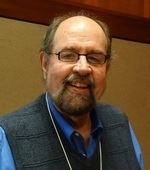 Saturday night, 7:30 p.m.: Dr. William Beeman, anthropology
Saturday night, 7:30 p.m.: Dr. William Beeman, anthropology
The Meistersingers: Opera Performance in Germany
A noted cultural anthropologist, Dr. William O. Beeman has written extensively on music and performance both in Western and non-Western traditions. His latest book on this topic is Iranian Performance Traditions; his co-authored book The Third Line: The Singer as Interpreter, is widely used in teaching and research. His forthcoming book: The Meistersingers: Opera Performance in Germany centers on his experience as an opera performer in a leading German opera house. In this talk, he will share this experience and explore some of the differences in musical performance of western and middle-eastern traditions. Please see the Sunday Morning schedule for additional details on Dr. Beeman’s interests and expertise.
Sunday morning. 9:30 a.m.: Dr. William Beeman
The U.S. and Iran: So, What’s Next?
A man of many talents, Bill Beeman is best known as a leading expert on Middle Eastern affairs. In response to queries about his take on the tenuous “peace” between the U.S. and Iran, Bill has offered to hold an informal lecture / discussion on Sunday morning to explore the history and traditions of Iran, how they influence present-day tensions, and what likely developments might now unfold.
Dr. Beeman is Professor of Anthropology at the University of Minnesota, where he is currently Department Chair. Renowned as a Middle East Specialist for more than 30 years, he has also worked in Central Asia, the Caucasus, Japan, China and South Asia. An expert in Iranian culture and linguistics, he is author or editor of more than 100 scholarly articles, 500 opinion pieces and 14 books, including Language, Status and Power in Iran, and The "Great Satan" vs. the "Mad Mullahs": How the United States and Iran Demonize Each Other. He has consulted to the Department of State, the Department of Defense, the United Nations and the European Union on Middle Eastern affairs.
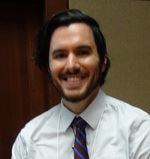 Sunday afternoon, 1:30 p.m.: Bryan Yazell, Ph.D. Candidate, Literature
Sunday afternoon, 1:30 p.m.: Bryan Yazell, Ph.D. Candidate, Literature
John Steinbeck and Migrant Labor Policy
We know society is revealed in literature – but does literature also shape social values and norms? In this talk, we explore the role of John Steinbeck's iconic migrant family from The Grapes of Wrath in the development of 1930s New Deal welfare policy, addressing the problems of poverty and homelessness on a national scale. Steinbeck imagined his archetypal group of “Okies” even as he collaborated with the state, both indirectly and directly, in designing strategies to manage the western movement of migrant farmers. Together, we will discuss the ways that Steinbeck’s novel and nonfiction work have contributed to a crucial revision in the public view of migrant labor, with impacts that extend into the present day.
A 2015 PBKNCA scholarship awardee, Bryan is a Ph.D. candidate and lecturer in English at the University of California, Davis. His dissertation, Tramps Abroad: Transatlantic Vagrancy, Migration and Citizenship 1880-1940, reconstructs the international discourse that shaped the literature of homelessness in the US and Britain near the turn of the 20th century.
Sunday afternoon, 4 p.m.: Members Reception
All speakers and attendees are warmly invited to relax with us on the terrace adjacent to the Dining Hall for a complimentary glass of wine, beer, or lemonade, accompanied by cheese and other tasty treats. In the event of inclement weather, indoor facilities will be provided; please check with the Front Desk for updates, if needed. (Additional wine /beer is available on a “no host” basis.)
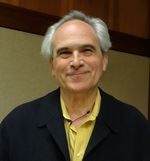 Sunday night, 7:30 p.m.: Mark Burstein, literature
Sunday night, 7:30 p.m.: Mark Burstein, literature
What Is It About Alice?— The 150th anniversary of a literary phenomenon
This year marks the sesquicentennial of the publication of Alice’s Adventures in Wonderland, a phenomenally popular and influential book, the most quoted and widely illustrated novel ever written, and among the most translated. But what is it about Alice that makes it so? In a lavishly illustrated talk, Mark Burstein discusses the phenomenon of this “children’s book” that has claimed the attention of adults for a century and a half, with digressions into its adaptations, academia, globalization, the life of Mr. Dodgson and his muse, and his own life in and out of Wonderland before attempting to answer the question.
Mark Burstein is president emeritus of the Lewis Carroll Society of North America, longtime editor of its magazine, Knight Letter, and editor of or contributor to fourteen books about Carroll, including editing and art-directing the new, expanded edition of The Annotated Alice and the first trade edition with the Dalí illustrations. He curates a world-class Carroll collection started by his father.
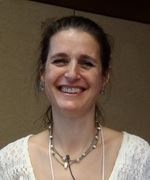 Monday morning, 9:30 a.m.: Llisa Demetrios, sculpture / design
Monday morning, 9:30 a.m.: Llisa Demetrios, sculpture / design
“Making the best for the most for the least”: a Childhood in the Eames tradition
Best known for their “mid-century modern” furniture designs, Charles and Ray Eames epitomized the modern era. They believed in the honest use of materials in their furniture, films, and architecture. “We wanted to make the best for the most for the least.” Their hands-on, learning-by-doing process explored the possibilities of materials new and old, like fiberglass, aluminum, wire, plastic, and molded plywood. They never delegated understanding, doing iteration upon iteration of scale models to hone an idea.
Award-winning sculptor Llisa Demetrios discusses her grandparents Charles and Ray, who put her and her siblings in their short films, taking them around their exhibits, photographing, staying at the Eames House, showing three-screen slide shows, building House of Cards sets, flying kites, and the like. These playful interactions were also valuable lessons on the design process, such as circling an idea and looking at it from different perspectives, and the importance of deep understanding of a material.
On a personal note: Ms. Demetrios and Mr. Burstein are happily married to each other.
Deirdre Frontczak, Asilomar Chair

